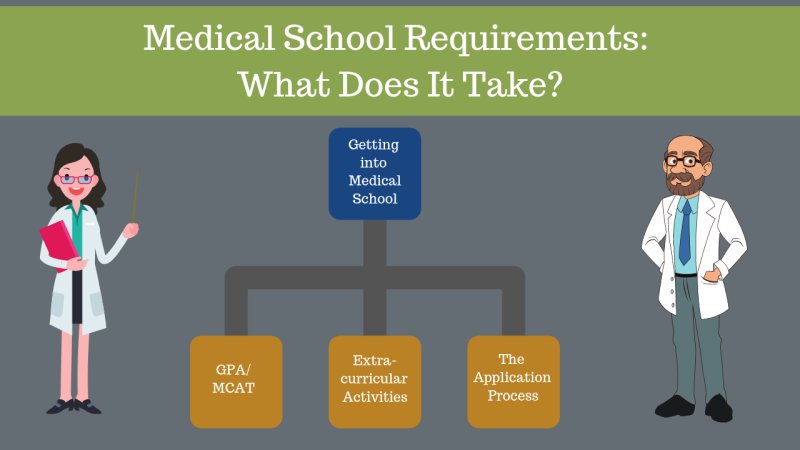

While official medical school requirements for every medical school are listed in the Medical School Admissions Requirements, there are common scholarly and extracurricular activities that medical school admissions committees want to see — discover what those medical school “requirements” are in this article.
Because the study of medicine requires a fundamental understanding of the sciences and mathematics. Therefore, medical school requirements are focused primarily on biology, chemistry, physics and mathematics . However, many medical schools also want to see that you have taken math and English.
Medical school admissions committees also need to be convinced that you understand what it means to practice medicine, work with people from different backgrounds, and be an effective member of a team among other attributes.
By reading this article, you will understand the academic, scholarly, and extracurricular medical school requirements so you will be well-positioned when you apply to medical school.
And, believe it or not, you can actually enjoy the process because it is that interesting and fun. Yes. FUN!
Table of Contents
To be eligible for a medical degree in the United States, you must have earned an undergraduate college degree before you start medical school. Many students ask if the undergraduate college status or prestige matter when it comes to medical school admissions. There is no clear “yes” or “no” answer to this question.
Some undergraduate colleges are especially prestigious or notoriously difficult and medical schools might consider this when evaluating a student’s GPA. In the same way, if a student attends a college that is considered easy, the GPA will be considered within that context.
For example, let’s say Student A went to a very prestigious college which is notorious for grade deflation and gives out very few As. She has a GPA of 3.45 with an upward trend. Now, let’s say student B went to a less prestigious college and earned a 4.0 GPA. Student A, depending on other factors such as the MCAT score and activities, might be considered a more competitive applicant than Student B who went to a much less rigorous undergraduate college.
The MCAT is really the great equalizer in this process. So, if Student A and Student B both earned a great MCAT, let’s say a 523, they would both be equally competitive assuming all other factors were equal.
Many students attend less competitive colleges for good reason and medical schools know this! There are also many prestigious college honors programs that medical school admissions committees consider quite impressive. A high GPA earned at ANY college is impressive especially if it’s matched strong course rigor and a high MCAT score.
Equally important to understand is that attending an “elite” college will not be your ticket to medical school. In fact, sometimes medical schools seem to expect more from student who attend elite colleges. This is anecdotal information based on our work with students in the most recent application season.
The bottom line? You can get into medical school from any undergraduate institution as long as you do well academically and take advantage of the opportunities available to you.
Medical school prerequisites may vary from med school to med school. However, the vast majority of medical schools have the following prerequisites:
Some medical schools also require the following prerequisites:
Keep in mind that many medical schools will not accept AP credit to satisfy requirements.
To be safe, we recommend taking all of the coursework listed above. Keep in mind that all courses must be taken before you matriculate to medical school rather than before you actually apply.
In addition to the courses listed above, we recommend students take upper level science classes in any discipline.
Since medical school prerequisites differ, it is important to review each medical school’s required courses before you apply. We recommend taking all required courses at a four year university in the United States or a community college if this was part of your education path.
For the most up to date listing for specific medical school’s requirements, refer to this document from the Association of American Medical Colleges.
What is “competency-based” admissions?
More medical schools are moving towards “competency-based” admissions meaning those schools don’t require specific prerequisite, but, prefer to see competency in certain disciplines including biology, chemistry, physics, mathematics, and the humanities.
However, until all medical schools move towards competency-based admissions, we suggest taking all of the traditional medical school prerequisites.
Will medical schools accept advanced placement (AP) credit?
Many students who take AP classes in high school “place out” of some required prerequisites in college. Not all medical schools will accept this AP credit however many will.
Therefore, is important to check with individual medical schools regarding specific requirements. I suggest that students seek out this information before starting their freshman year. I have worked with clients who placed out of biology and took chemistry instead. Not only did this make their college course load demanding as took upper level science classes from the start of college, but, some medical schools would not accept the AP biology credit.
To find out definitively what each medical school requires, refer to Medical School Admissions Requirements updated annually by the Association of American Medical Colleges .
Do medical schools accept community college classes and credits?
The majority of medical schools will accept community college credits. We advise students check the MSAR for specific requirements from each medical school. Medical school admissions committees understand there are many reasons students enroll in community college classes and these choices will be viewed within the context of your entire application.